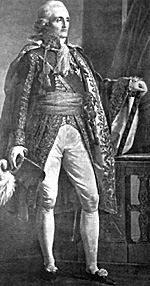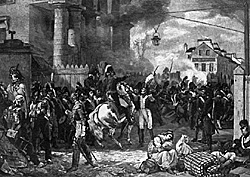The Fighting Marshals
Moncey
by Ian Barstow, UK
| |
It was his father's wish that Moncey follow hi into the legal business and from an early age the boy was obliged to study law. This was clearly not what he wanted and at fifteen he ran away from home and joined the army. As you do. A somewhat unhappy parent searched out his son and forcibly purchased his discharge in 1773. However only a matter of 10 months later Moncey had effected another escape and had once more enlisted, this time in the Gendarmes Anglais. This was a far more swinging outfit than the run-of-the-mill infantry regiments that he had first gone to.
Rather surprisingly, considering his eagerness for uniformed service, Moncey was dismissed on a misconduct charge. The papers read as follows: 'He has left the service on account of ignorance and fickleness; he has a good appearance, but is not really to be regretted; not to be re-enlisted.' Ouch. This was not enough to deter Moncey however, and he actually managed to contrive a commission in the future Montreal Regiment in August of 1779.
Lieutenant
It was 1785 before Moncey reached the hallowed heights of a full lieutenant, careers in the Bourbon army being heavily restricted by virtue of birth. On June 1st, 1788 Moncey transferred to the 5eme Bataillon de Chasseurs and in 1791 he made captain. This was of course during a period which we might term as being somewhat unrestful. With the mass desertion of aristocratic officers and the bloody methods of the Revolution, promotion opportunities, as we have seen before, suddenly came quickly. Providing that you were fortunate enough to survive.
Moncey was one of the fortunate ones. He had been in enough grief with the old Bourbon authorities to have a bit of a reputation behind him, and he had no obvious political feelings, making him a low priority case in the eyes of the Public Representatives, that sinister arm of the Revolution who may be seen as the forerunners of the NKVD and KGB. Between 1793-95 Moncey served in the Pyrenees with great distinction. Mind you the Pyrenees do border Spain.
General
In June 1793 Moncey was promoted to command the 5eme Demi-Brigade de Legere where he caught the eye of one of the Representatives of the People. In this case it was a good thing. He was promoted to General de Brigade in February 1794 and four months later he was a General de Division. He culminated a thoroughly successful year with the capture of San Sebastian in August. On August 17th he was promoted to command the whole army. By any standards, even amongst those we have already studied, this can genuinely be termed meteoric. Admittedly the Directory was in need of success, even against the Dons, but Moncey had done well.
With the cessation of hostilities in July 1795 Moncey's army was disbanded. He was offered command of Coastal army based around Brest but he refused, pleading ill-health. It has been alleged that Moncey did not have the stomach for the kind of fighting going on in the Vendee. It is difficult in this case to say what exactly Moncey's reasons were, but instead he found himself commanding an infantry division at Bayonne.
From private letters of the time it appears that Moncey was also somewhat shell-shocked by his rapid rise through the ranks. This is hardly surprising. It must have been something of a culture shock to receiving salutes from men who a matter of days before had been his considerable superiors.
Once more things were thrown into the melting pot by the coup of September 4th, 1797 and Moncey was to find the price of his meteoric rise. He had of course made enemies, if for no other reason than good old envy. Within a month he had been denounced as a royalist and suspended from duty. Cordial relationships with Pichegru and Carnot provided these enemies with ammunition. Bringing up his unwillingness to serve in the Vendee, Juncker, the adjutant-general also denounced him and he was dismissed from the army on October 26th, 1797.
Army of the Rhine
Moncey remained on the unemployed list until September 20th, 1799, seventeen days before Napoleon's coup, which he supported, mainly because of his hatred of the Directory which had ruined his career. Following a couple of quick divisional commands, Moncey became second-in-command to Moreau with the Army of the Rhine in March 1800.
Moncey performed capably in mainly ancillary roles as the army crossed Switzerland into Italy. The only item of note however was unlikely to impress his future emperor, when Moncey was hoodwinked by the Austrian general Laudon into believing that there was an armistice, allowing the Austrians to escape a trap. This was the sort of enterprise Napoleon expected of his generals. This case has been cited along with others as evidence of Moncey's good and honest character. Sadly this is as useful to a soldier as a truss is to a hamster.
Brune, commanding the army at the time, was less than impressed himself, and demanded Moncey's removal, but ironically it was Moncey who succeeded Brune two months later in command. This didn't last long though, and when he was offered a junior post under Murat he declined and left his command in the Cisalpine Republic on August 28th, 1801.
Spain
It did look at first as if Moncey's baton would never see much in the way of action, but when war in Spain once more beckoned, Moncey's previous form came into play. He knew Spain and the Spaniards, and he had beaten them already. In January of 1808 Moncey led 30,00 men of his Corps d'Observation into Spain moving to Madrid. After experiencing a little of the insurrection in the capital he was posted off to capture Valencia and Cartagena, but unfortunately failed dismally. It has been claimed that the 9,000 troops he was given were not up to the task, but I fear that such charity is unwarranted when one bears in mind the quality of opposition he faced. It may simply have been that a man becoming rapidly old had lost whatever touch he once had.
Napoleon however stuck by no. 3 on the list, bumping him up to Duc de Conegliano on July 2nd. He was certainly well in with the people who mattered. Given III Corps, he then served under Lannes at Tudela and then at the Siege of Saragossa alongside Ney. Things went slowly however and Napoleon's fickle favouritism moved on. Moncey was recalled on January 2nd, 1809. Once more Moncey's over-kindness to the enemy was to cost him in his career.
The rear echelon beckoned and until 1814 Moncey went through a succession of jobs in Belgium and France, culminating in command of the Paris National Guard. With the debacles of 1813 and the struggle that followed on home soil, this suddenly became the front line and Moncey was conspicuous by his gallantry in defending the city. Withdrawing to Fontainebleau, Moncey, along with Ney and Lefebvre approached Napoleon and told him of the abdication demands made by his colleagues. For none of them was this their finest hour, but certainly in Moncey's case it can be assumed that he thought he was acting in the country's best interests.
Accepting the usual positions from the Bourbon, Moncey went straight over to the emperor in 1815. He played no active part in the Hundred Days, due to his age, but his finest hour was yet to come. When Ney came to trial, Moncey was nominated in charge of the proceedings. As we know some disgraced themselves by taking part, others pleaded illness, but Moncey merely wrote to the king saying: 'No Sire, if I am not allowed to save my country, nor my own life, then at least I will save my honour.' The Bourbons were furious and Moncey and dismissed him at once, sending him to prison at Ham for three months.
He was reinstated in July 1816 and made a peer once more in 1819, before serving once more in Spain in 1820 when France intervened in the civil war. He was appointed governor of Les Invalides on December 17th, 1833 receiving the body of Napoleon on its return from St Helena in 1840. On April 20th, 1842, the old soldier died and was buried close to the emperor in the Aisle of the Brave.
So?
So, what do we make of Moncey? Well he didn't actually do much, or more specifically he was almost always engaged in the minor theatres, thus missing the limelight which is a prerequisite of historical greatness. Perhaps militarily his best moment was at the age of sixty defending the Clichy gate in Paris with his raw conscripts. He was without doubt a good and honest man, characteristics to be admired in say a priest but not I fear in a soldier.
His limitations raised themselves on a number of occasions, most specifically the lack of a killer instinct. However it was this very characteristic which made Moncey stand tall at Ney's court-martial, and for this reason alone he is to be regarded most highly. Perhaps Moncey would have been best used throughout as a REMF where his innate decency would not have been a hindrance. Cynical, aren't I?
|
 Ioncey was born Bon Adrien Jannot on July 31st, 1754 at Palise near Besancon, the son of an advocate. In 1789 the Jannot family subsequently acquired an estate near Moncey at which time they took the name of the town as an addition to their own. Prior to that the future marshal had been simple old Jannot. For the sake of completeness and convenience however, I will refer to him throughout this piece simply as Moncey.
Ioncey was born Bon Adrien Jannot on July 31st, 1754 at Palise near Besancon, the son of an advocate. In 1789 the Jannot family subsequently acquired an estate near Moncey at which time they took the name of the town as an addition to their own. Prior to that the future marshal had been simple old Jannot. For the sake of completeness and convenience however, I will refer to him throughout this piece simply as Moncey.
 At the start of that December Bonaparte made Moncey inspector-general of Gendarmerie, a position he held for a full six years, although by its nature it was neither time consuming or demanding. In this role he did get to accompany the Great One to the Low Countries in 1803 and as we have seen before the best way to keep in Napoleon's eye was to sit under his nose. It was probably this that accounts for Moncey's otherwise surprising promotion to the Marshalate on its inception on May 19th, 1804, third in seniority, along with the usual hidden political machinations.
At the start of that December Bonaparte made Moncey inspector-general of Gendarmerie, a position he held for a full six years, although by its nature it was neither time consuming or demanding. In this role he did get to accompany the Great One to the Low Countries in 1803 and as we have seen before the best way to keep in Napoleon's eye was to sit under his nose. It was probably this that accounts for Moncey's otherwise surprising promotion to the Marshalate on its inception on May 19th, 1804, third in seniority, along with the usual hidden political machinations.